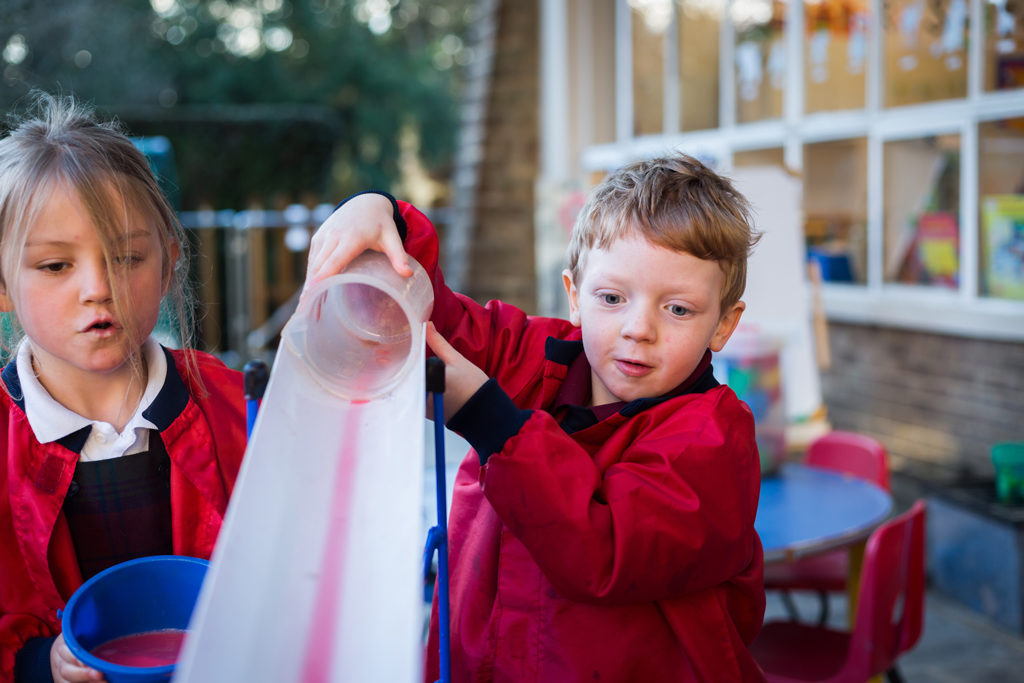How to Help your Child Transition to Reception
This post may contain affiliate links. Learn more
It’s your child’s first day in Reception. You spend the day worrying about how they are getting on and cannot wait to pick them up, full of questions: ‘Who did you play with? Did you eat lunch? Have you made friends?’ Knowing how to help you child transition to Reception is tricky.
The chances are they have had a happy, busy day. Sometimes, however, getting over the hurdle of the first day or two is only the beginning. Your child may start to become a little clingy in the mornings, once the initial excitement of starting school has begun to wear off, tiredness sets in and they realise they will be away from home Monday to Friday. But fear not, as Rachel Harris, Head of Early Years at Barrow Hills School shares her top tips to help you, and your child, with the transition to reception.

Stay Calm
It can be hard if you have a wobbly child in tow, but try and stay calm, kind and positive if your child shows signs of being upset when leaving you. Your child will be quick to pick up on your distress; and may make them feel that there really must something to worry about, if mum or dad are upset as well!
Speak to your Teacher
If you have any concerns, no matter how small, speak to your child’s class teacher (away from your child’s little ears!). The teacher is there to support you and your child and ensure that the transition to Reception is as smooth as possible. If there is an issue with certain points, such as being left in the morning, the teacher will be able to put in place strategies to help: for example, giving your child a task that they would personally enjoy to carry out when he or she comes in.
Furthermore, if your child does speak about any worries, reassure him or her that the adults in the classroom are there to help. Keep an open line of communication with your child’s teacher: share any concerns that your child has expressed, as well as anything that may be happening at home that could affect how your child is feeling. The fuller the picture the teacher has, the better able he or she will be to help and support.
Show an Interest in their Day
Talking to your child about their day is also very important. It is crucial to show an interest in your child’s school life; but remember not to get that list of questions out. If you know your child has done a specific task, through an online ‘learning journal’ or something similar, ask about this. Saying, “It looked as though you were having a lovely time with the playdough today – what were you making?” is more likely to receive an enthusiastic response than the more general, “What did you do today?”

Support their New Routine at Home
You may also find that your child behaves beautifully in school but exhibits unusual or more challenging behaviour at home. This is not uncommon when children start Reception: after working hard during the day and acclimatising to the school’s behaviour expectations, children may let it all go when they get back to their familiar surroundings, especially when they are exhausted. A few things can aid the transition back to the home environment:
- Bring a snack to pick up. This gives your child a chance to recharge their batteries on the way home.
- Let your child have some rest and relaxation in the evening. Bear this in mind when choosing any after school clubs or activities for your child.
- Stick to a normal bedtime routine, building in time for their delay tactics.
Practice Makes Perfect
There are practical things you can do to help your child’s first experience of school. There can be a lot of dressing, undressing, doing up zips, changing into trainers, putting on aprons and so on in Reception, so practising these skills at home (when you have plenty of time!) will help your child become independent and foster his or her sense of mastery. Try making the process more fun – I find myself singing ‘Zippity Doo-Dah, Zippity Day!’ with gusto to encourage children as they get themselves zipped up for playtime.
As well as these practical skills there are a whole host of ‘soft’ skills that children will have started to develop, which you can nurture in your child at home. During the Reception year, the children will be taught life skills such as ‘what makes a good friend’; but anything you can do at home to encourage your child to master the arts of sharing and taking turns will serve to support their social interactions in class. Fixing up some play dates in a neutral environment (such as a trip to a local park), rather than inviting children back to your house where your child may become territorial over their toys, can also be beneficial.
Don’t Panic
Remember that teething problems during the transition to reception are entirely normal – this is a significant step your child is taking in their lifelong learning journey. However, the school’s teaching team will be there to offer caring support to your child… and to you, when you wonder how it’s possible that someone fitting into ‘age four’ clothes could possibly be growing into such an independent person.
